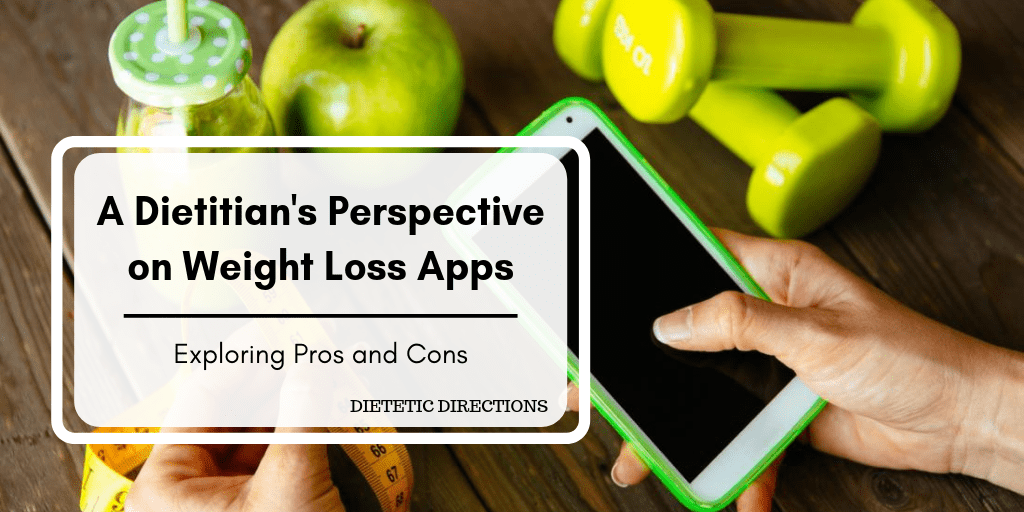
A Dietitian’s Perspective on Weight Loss Apps
~Exploring Pro’s & Con’s~
Do weight loss apps work? Many clients wonder if apps such as My Fitness Pal can actually help them lose weight. Many people are curious if weight loss apps can serve a useful purpose in terms of improving their nutrition. Today, I will be “weighing in” on weight loss apps and exploring the pros and cons along with the potential role and risk they play in healthy eating.

Whether you are looking to lose weight or improve your relationship with food, it’s beneficial to meet with a medical professional beforehand. First of all, health decisions (like tracking your food intake on a diet app) need to be individualized. What works for some does not work for everyone. Consulting with a registered dietitian and/or your medical doctor can help you make a decision that’s best for you.
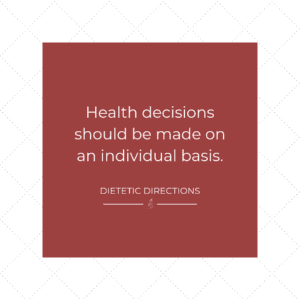
Without further ado, let’s ‘tap’ into the pro’s and con’s of diet-tracking apps!
Pro’s of Weight Loss Apps
Accountability
- Apps like My Fitness Pal allow people to be accountable by tracking what they are consuming. Being aware of our daily food intake is important as we often eat on autopilot and forget what and how much we actually eat.
- Apps often have large food database including many restaurants (over 1 million foods in My Fitness Pal). Plus, they have barcode scanners to make food entry easy. Tracking on the go? MFP makes it easy for you to scan a bar code and track your meal. Easy as 1-2-3!
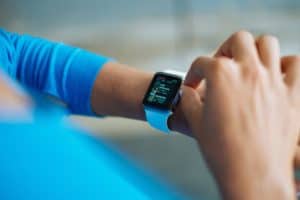
Reaching goals
- Thinking of tracking your intake? There is some evidence that individuals who keep a food diary are more likely to lose weight.
- Tracking apps may improve general healthy eating habits. For example, some individuals understand their intake goals/macros and meet daily targets better. Specifically, a vegetarian or athlete may want to better understand how much protein they are getting at each meal. MFP is a useful tool for these individuals!
- Apps can help you track specific or difficult to reach nutrients and micronutrients to ensure you are getting enough fibre and potassium in your diet.
- First, your dietitian or doctor can provide a specific target for sodium intake (not necessarily the one generated on the app itself – one that meets your individual needs). Then people can see how much salt is in their foods and choose low salt alternatives. Visually seeing barcodes with red lines indicating above the recommended daily sodium limit can be enough to inspire individuals to make small changes in their diet that are sustainable over time.

Social support
- Using an app helps provide an extra level of detail to track macronutrients (aka macros). Click here to book with Chelsea, she’s our sports nutrition dietitian on the Dietetic Directions team!
- Tracking apps allow you to share your results (by exporting intake records/results) to your dietitian.
- Connect to the networking option on the online community forums – we know social support helps people to improve health behaviour. Tracking apps often allow you to add “friends” for motivation.

Convenience
- Apps allow you to track physical activity – this could help keep some people feeling accountable and motivated.
- Smartphone apps are extremely convenient and portable.
- They’re helpful for those looking to meet specific meal or daily targets who are not practicing intuitive eating. Plus, your dietetian can override individual targets for a more accurate estimate.
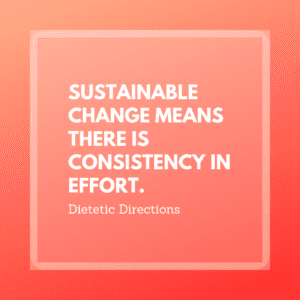
Con’s of Weight Loss Apps
Negative habits
- Can be time-consuming entering all foods, beverages and physical activity into an app. Therefore, the sustainability of tracking apps can be challenging in the long-term.
- Entering foods and tracking calories can be highly triggering for those who had or have disordered eating.
- Calories and macronutrient targets generated by apps may not be accurate for individual needs – instead, it’s recommended to consult with a dietitian for individualized targets and use the app as a tool to input foods to meet your targets.
- When the primary goal is weight loss, these apps promote taking a “weight focus” instead of a more well-rounded “health focus.” Energy level, mood and blood work can also improve through diet and lifestyle improvements. There unfortunately aren’t ways to track these aspects of our health on apps like MyFitnessPal.
- May promote “all or nothing mentality” around eating where we are “being good” or “wrecking everything” based on meeting calorie targets. Consequently, this attitude can negatively polarize our feelings towards foods and sabotage positive changes.
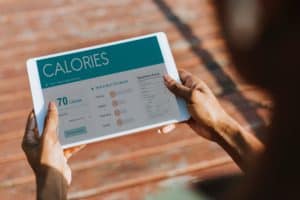
Competition
- Apps often “normalize” dieting behaviour and calorie counting. What ever happened to listening to our bodies, eating good foods most of the time and stopping when we are full?
- They risk turning eating into a game you need to be competitive and “win” at – users end up aiming to eat fewer calories and restrict their intake to meet targets. This can become unhealthy and lead to unsustainable eating patterns and obsessive thoughts around food.
- There’s a chance weight loss apps may contribute to or create obsessive behaviour or preoccupation with measuring, weighing and counting calories. We can all agree this is neither fun nor is it necessary for successful weight loss and building healthy habits.
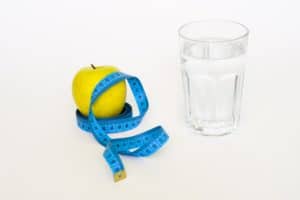
Lack of accuracy
- Generalized nutritional guidance doesn’t address complex health conditions – for example, being diabetic or experiencing kidney failure and/or being on medications. As a result, a change in diet or weight loss may impact your health.
- They can be frustrating as following their targets does not necessarily lead to weight loss. Unfortunately, they may lead people to stop their healthy changes because they do not see immediate and easy results.
- Food portions are not always accurate unless the user is closely measuring or weighing food. Also, many people wait until after meals or until the end of the day to track what they ate.
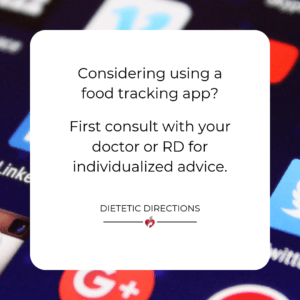
Errors
- Some food items and recipes are not in the app – you may have to create your own recipe (like Mom’s meatloaf, broccoli casserole and garlic mashed potatoes) to estimate the nutrition – adding all the individual ingredients in a recipe takes time. However, you can save your own recipes to input in future entries.
- Some errors exist on the nutrition apps for some foods.
- There’s less focus on making small changes and keeping them up (like adding extra vegetables to dinner or going for a walk at lunchtime) – tracking apps are more focused on calories in and calories out.
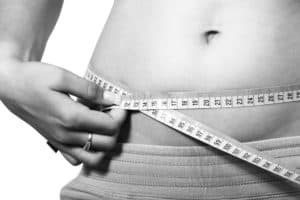
The focus might be in the wrong place
- These apps are typically very focused on setting “weight goals” – this can perpetuate a false belief that we can manipulate our weights more than is realistic based on our body-type, metabolism, and dieting history. This can lead to feelings of defeat and failure or taking unhealthy and restrictive measures.
- It’s not only about calories in vs. calories out. The spacing of meals, balance of meals, regulating hunger hormones, and meeting vitamin/mineral targets are all important factors in weight management and overall health.
- Delayed happiness – weight loss apps promote the belief that if you can achieve said weight loss or calories count you will be happy. Read here to learn why weight loss won’t make you happy.
- Tracking apps give people a false sense of control without addressing underlying emotional triggers that lead to binge episodes or low body image in the first place. These issues can not be fixed by simply changing your weight or tracking your food.
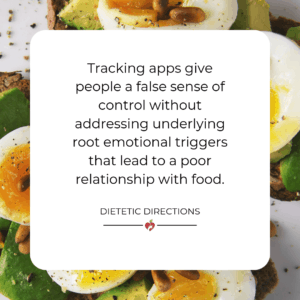
Bottom Line:
Overall, weight loss tracking apps are helpful for some, but they’re not helpful for everyone. They can improve accountability or food awareness by recording intake. Furthermore, they can enlighten us as to how much we are consuming when often eating on autopilot. Apps are equipped to provide detail on macronutrients and micronutrients that can be helpful when working on these specifics with a dietitian. However, remember that targets generated on apps may not be accurate as they are based on height and weight and do not take into account our individual body-types, metabolisms and dieting history.

Healthy eating can occur beyond the weight loss apps. Be sure to notice how you feel after eating in terms of fullness. Be aware of your snacking behaviour throughout the day. Finally, be conscious of when you find yourself emotionally eating. Above all, be open to assess the relationship you have with food. These are all factors that play a role in overall eating behaviour. If you are able, consult with a dietitian for professional dietary guidance for individualized guidance and strategies that are sustainable for you.
Now it’s your turn! What do you think about weight loss apps? Do you find them a helpful tool or a hindrance in your everyday life?
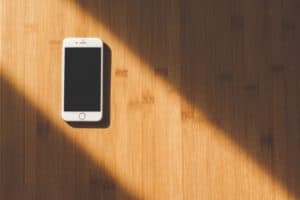
P.S. Andrea was interviewed by Global News for their story “Calorie-Tracking Apps can help with weight loss, but aren’t perfect, experts say.” Check it out!


